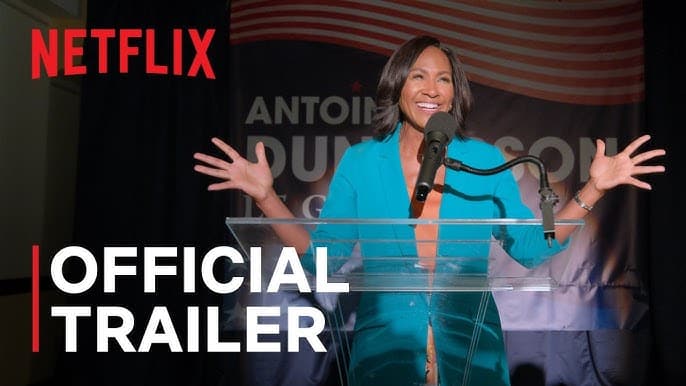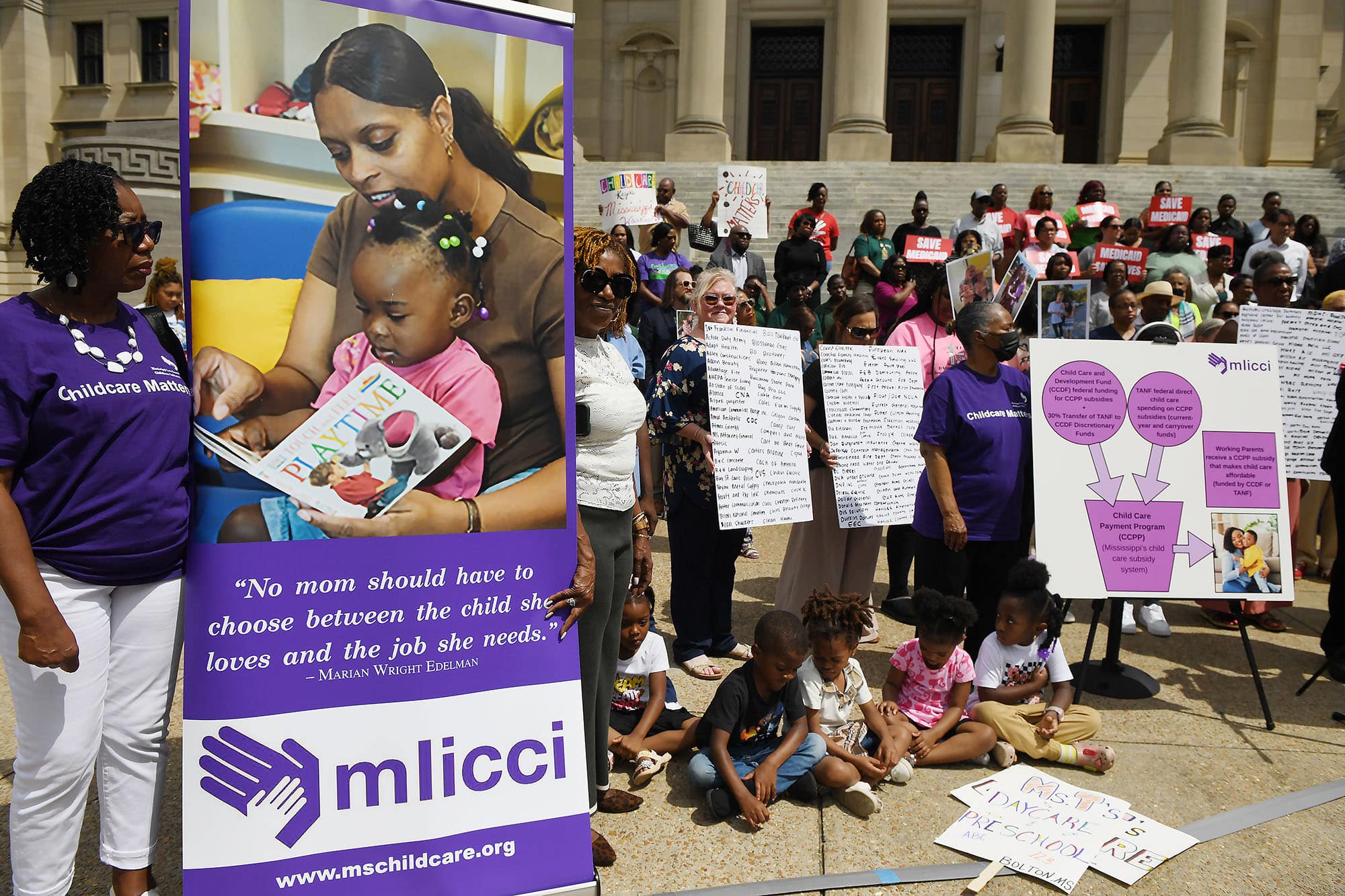Mississippi Today
Tyler Perry comedy about a Mississippi lieutenant governor ‘She The People’ set to stream on Netflix

Netflix has announced it will stream “She The People,” a comedy written, produced and directed by Tyler Perry based on a fictional newly elected Mississippi Lieutenant Governor, Antoinette Dunkerson, played by Terri J. Vaughn.
According to a trailer released Thursday and press about the show, the new Lt. Gov. Dunkerson character realizes her new job will be extremely tough due to a sexist and condescending governor.
Executive producers for the show include Niya Palmer, Vaughn and former Atlanta Mayor Keisha Lance Bottoms. The cast also includes Tre Boyd, Dyon Brooks, Jade Nova, Jo Marie Payton and Drew Olivia Tillman.
The first eight-episode season debuts May 22 on Netflix, with a second eight-episode season premiering Aug. 14.
This article first appeared on Mississippi Today and is republished here under a Creative Commons Attribution-NoDerivatives 4.0 International License.
Mississippi Today
Parents, providers urge use of unspent TANF for child care

Child care providers, parents, children, legislators and advocates gathered outside the state Capitol Thursday to call on Mississippi to use unspent welfare funds and resume accepting child care certificate applications.
Last month, the Mississippi Department of Human Services announced it will temporarily stop accepting new applications, redetermination applications and “add a child” applications for the child care certificate program for certain families as the result of the loss of COVID-19 relief funds. The hold, started March 31, will continue indefinitely. The program provides child care vouchers to eligible families, often with a co-payment fee.
MDHS explained that without the COVID-19 relief funding the number of families with child care certificates is more than it can support long term. When asked how long the hold would last, chief communications director Mark Jones explained the hold would end when the number of children with certificates dropped below 27,000 children and $12 million in monthly costs.
The week before the hold began, on March 28, 36,186 children had child care certificates. 25,300 of them fit into one of the MDHS’s priority categories. 10,800 did not.
The Mississippi Low-Income Child Care Initiative, Child Care Directors Network Alliance, Mississippi Delta Licensed Child Care Providers, and Mississippi Black Women’s Roundtable organized Thursday’s gathering and press conference to implore MDHS to tap into unused TANF funds to book the child care payment program.
“DHS has about $156 million in money from prior grant years that has gone unspent,” said Carol Burnett, MLICCI’s executive director, at the press conference.
The child care payment program gets funding from federal and state sources. It received $127 million from the Child Care Development Fund in fiscal year 2024, as well as $7 million in state appropriations, and $25.9 million transferred from the Temporary Assistance for Needy Families grant.
That $25.9 million is 30% of the state’s annual TANF grant money transferred into funds for child care certificates. It is the maximum amount they’re allowed to transfer under federal law. The state also spends 85% of its money from the child care development fund on certificates, when federal law requires them to use at least 70%.
MLICCI and others want MDHS to add to that by spending current and carryover TANF funds on child care subsidies for families that qualify for child care certificates. According to a memo MLICCI prepared, this method does not require legislative action, has no spending limit, and is already used by other states.
Under the current hold, families can apply and get their certificates renewed if they fall in one of the following six categories: on Temporary Assistance for Needy FamiliesTANF or transitioning off of TANF, homeless, with foster children, teen parents, deployed military, orand with special needs. The Division of Early Childhood Care & Development will continue paying for certificates for all families until their certificates expire.
In a statement, MDHS’ chief communications officer Mark Jones said “MDHS understands these concerns and reaffirms its commitment to support child care, transportation, education, and other needs of families who need to return or remain in the workforce. Our aim is to ensure our approaches are sustainable.”
Burnett, parent KyAsia Johnson, state Rep. Zakiya Summers, D-Jackson, and multiple child care providers talked about the toll the hold has taken on child care centers and families. They also stated the importance of child care to sustain the state’s workforce, keep child care providers afloat, and educate young children.
They also urged citizens to contact the state’s political leadership to get their attention.
“This decision is putting people like me in an impossible situation,” said Johnson, a child care provider and parent. “What am I supposed to do without child care?”
Each provider spoke about how they had to explain the hold to parents, many of whom have had to pull their children out of day care. Cantrell Keyes, director of Agape Christian Academy World in Jackson, had five families pull their children out of her center. “More than half of my school tuition comes from CCPP,” she said.

Rep. Summers called on MDHS to lift the hold on child care applications, use the extra TANF funds, and communicate better with parents and providers.
“Right now, thousands of Mississippi children might lose child care, not because the need has disappeared, but because the agency has made a choice,” she said.
The hold on child care certificates comes at a time when many child care providers and parents are struggling to stay afloat amid high costs, high turnover and high demand.
Deloris Suel, who owns Prep Company Tutorial Schools in Jackson, said, “Child care is in crisis. We’re not heading for crisis, we’re in crisis.”
This article first appeared on Mississippi Today and is republished here under a Creative Commons Attribution-NoDerivatives 4.0 International License.![]()
Mississippi Today
Struggling water, sewer systems impose ‘astronomic’ rate hikes

This is the second half of a two-part story on small water and sewer systems. Read part one here.
A December hearing at the Woolfolk Building in downtown Jacskon started to sound like an auction: Fifty percent. One hundred. Two hundred. Three hundred. State officials watched studiously from their dais as customers recited how much their water and sewer bills ballooned in the last few years.
Judy Johnson’s sewer bill in Raymond went from $16 in 2022, to $40 in 2023, to $52 in 2024, to $67 two months after that. David Huber in Natchez said his combined water and sewer bill grew from $50 to $108 in that same time.
“This is just for sewer?” Kathy Hardy, also of Raymond, recalled thinking when she saw the rate changes.
The three of them are among 28,000 Mississippi customers of Central States Water Resources, or Great River as its subsidiary in the state is known. In 2021, Central States – which operates in 11 states, mostly in the South – arrived in Mississippi, where it now owns 123 small water and sewer systems.
!function(){“use strict”;window.addEventListener(“message”,(function(a){if(void 0!==a.data[“datawrapper-height”]){var e=document.querySelectorAll(“iframe”);for(var t in a.data[“datawrapper-height”])for(var r,i=0;r=e[i];i++)if(r.contentWindow===a.source){var d=a.data[“datawrapper-height”][t]+”px”;r.style.height=d}}}))}();
In Mississippi, which has the lowest median income in the country, many Great River customers are seeing costs skyrocket for basic necessities that were or are still below regulatory standards. But for years, many of them previously paid low rates to providers who were, in turn, neglecting or underinvesting in their infrastructure.
“It just cascades and everyone keeps kicking the can until a crisis happens,” said Central States founder Josiah Cox. “The butcher’s bill is coming due. These places are falling apart.”
The result is a chasm between the perceived and actual costs of delivering water and sewer services.
In 2014, Cox started the St. Louis-based company hoping to fill a niche: buying and restoring struggling small systems that other large utility firms wouldn’t touch.
“Our thesis was pretty simple,” he said. “There’s small, failing water and wastewater systems all over the country. The giant publicly traded utilities don’t want to mess with them.”
Smaller companies often can’t afford administrative costs, like presenting rate cases in front of the state’s Public Service Commission. Larger companies aren’t interested because it would take years to see a return on their investment.
While Mississippi officials at the time were happy to welcome a company with Central State’s resources, the state’s ratepayers gave Cox’s team a tepid reception, to put it mildly.
In 2022, as the company started transitioning ratepayers to new rates to fund improvements, the PSC received letters from 800 Mississippians. They described Great River as “greedy,” accusing it of “gouging” them with “unconscionable” rate hikes.
“We are on a fixed income and finding it difficult just (to) pay our debts and put food on the table and pay for gas and meds,” one letter from a Senatobia customer read. “I pray your office will deny this increase request.”
As it turns out, Central States’ customers had similar complaints in Louisiana, Kentucky and Missouri, and ratepayers in North Carolina and Texas have called out the company over poor water quality and pressure.

Nina McGee, a Great River customer in Panola County, said her water bill used to be just $12 a month, which she admitted was “ridiculous.”
“I understand an increase,” said McGee, who lives in the town of Pope with less than 300 other people. “I just don’t understand why it’s got to increase that much. It’s tripled in three years.”
In the Wellsgate community, just outside of Oxford, residents sent 132 complaints to the PSC from 2020 to 2021. Most bemoaned poor water quality or water leaks. Great River bought the utility later in 2021 and found that, among other problems, the previous owner hooked up an unpermitted groundwater well – a violation of both state and federal law – that bypassed treatment and created a “blending of treated water and raw groundwater.”

Over the next two years, according to data from the PSC, Great River made about $1.5 million worth of improvements, such as adding new pumps and capacity to the water system. In 2022, PSC filings show, the company proposed raising the average water bill in Wellsgate from $12 to $47, a nearly 300% increase. Dozens of Wellsgate residents wrote the PSC in opposition.
“In no universe does this seem like an acceptable course of action,” one email said.
The company also took control of some of the state’s worst performing small sewer systems, including the ones Mississippi Today recently reported on. Many of those utilities hadn’t raised rates in years. Nearly 30 of the small sewer systems the company purchased, Cox said, never charged a rate at all. Some of those systems depreciated so much that Great River bought them for one dollar each.

At the December meeting in Jackson, Central States engineer Jacob Freeman testified to the PSC about the condition of some of the state’s sewage lagoons, a common form of treatment for small service areas like a subdivision. Freeman described lagoons he saw in the state where so much sludge had accumulated that it “breached the (water’s) surface.”
“At that point, you’ve taken up all the volume in the lagoon, so whatever small amount of treatment that Mother Nature could’ve provided originally is no longer happening, and raw wastewater is short-circuiting the lagoon, going out the back end,” he said, adding that, in similar cases, he’ll find bloodworms or pathogens pouring into the receiving watershed. “That’s dumping into a creek where maybe kids play, or flows down into another body of water that could be recreational. It’s a very, very bad situation.”
Freeman also testified that even with the high number of sewer facilities in the state violating their effluent limits for different pollutants – about one in three have done so in the last year, a Mississippi Today analysis found – others that seem to be in compliance could be circumventing Mississippi’s relatively lax testing requirements.
Many states, he explained, mandate quarterly or even monthly testing, versus the “once or twice annually” the Mississippi Department of Environmental Quality requires. So a utility that doesn’t meet permit limits, Freeman said, can choose to only be tested during suitable weather conditions when it’s less likely to have a violation.
MDEQ Executive Director Chris Wells emphasized that an operator could face criminal charges for lying about their test results or misrepresenting compliance. But practically speaking, Wells explained, the agency can’t regulate every system the same way.
“If you’ve got a system like Jackson’s that’s discharging (millions) of gallons a day into the Pearl River, that’s got much more of a propensity to cause environmental damage than a small lagoon somewhere in rural Mississippi that’s discharging 5,000 gallons a day into a tributary somewhere,” he said. “It’s not that we don’t care about that, we do, it’s just that it’s lower priority from an enforcement or from an inspection standpoint.”

In the roughly four years it’s been in Mississippi, Great River says it’s invested $27 million in system improvements, and has brought 35 sewer systems back into compliance.
Some customers, like James Windsor in Pass Christian, say while the new rates feel steep, their service has gotten better. Windsor said his water bill went from $18 a month to $51, which he felt would be a fair price if it also included sewer.
“Are we getting our money’s worth? I don’t think so, but it is better,” he said about improvements to water pressure and customer service.
Others say they haven’t seen any difference in what they’re paying for, and also criticize Great River’s pricing model. The company spreads out its repair costs, meaning someone on the Coast’s bill may increase, in part, to pay for repairs in north Mississippi. Doing so, the company said, keeps bills affordable for small customer bases whose systems need millions of dollars in investments.
!function(){“use strict”;window.addEventListener(“message”,(function(a){if(void 0!==a.data[“datawrapper-height”]){var e=document.querySelectorAll(“iframe”);for(var t in a.data[“datawrapper-height”])for(var r,i=0;r=e[i];i++)if(r.contentWindow===a.source){var d=a.data[“datawrapper-height”][t]+”px”;r.style.height=d}}}))}();
“I don’t think that’s quite fair,” said Andy Horyza, who lives in the Turkey Creek subdivision in Olive Branch. “If you’re living in a brand new subdivision and your costs are higher than mine, well guess what? Your costs are higher than mine, you should be covering that.”
Horyza, who relies on Social Security income, paid around $17 per month for sewer for about 20 years until Great River bought the system in 2021. Over the next three years, Horyza said, his bill jumped nearly 350%.
The company’s rates vary. For a sewer system using a lagoon, for instance, rates are about $42 per month, versus $59 a month for systems with actual treatment plants. For water, average bills are around $44.
In a February vote, state regulators at the PSC sided with their angered constituents, voting 2 to 1 to deny Great River’s latest rate hike. The PSC changed hands completely in the 2023 statewide elections. Southern District Commissioner Wayne Carr won his seat with a campaign criticizing Great River. Carr and Northern District Commissioner Chris Brown argue the company hasn’t justified the rates they’re charging.
“The service hasn’t changed, but the rates went up extensively,” Brown said, estimating that other rural customers on average pay less than $30 a month for water. “So the question is why? You’re supposed to have economies of scale. As public service commissioners, we want to make sure that rate payers are getting what they’re paying for.”
Central District Commissioner De’Keither Stamps disagreed. Stamps, the lone opposing vote, said some people would be “outraged” if they knew about the condition of their water and sewer systems, and that it’s unlikely the necessary funds to fix them will come from somewhere else.

“I choose to operate in reality,” he said. “The campaigning is over. It’s time to govern.”
Stamps also argued that if Great River appealed the PSC’s decision – which it since did in Harrison County Circuit Court – the company could then add its legal expenses to future rate increases. That case is ongoing.
Leo Manuel, a Mississippi attorney representing the company, explained the previous trio of commissioners set Great River’s rate schedule, so most customers’ bills were set to increase regardless of the February vote.
The reality, some experts believe, is that some customers of small utilities around the country are facing a seismic shift in the cost of their basic services, whether it happens now or later. Not only have many of these systems not accounted for the true financial needs of their infrastructure, but they also lack economies of scale. And for many small private systems, which don’t have the same access to government grants as public utilities, raising rates is the only way to make the difference. A 2023 federal report estimated that small water systems in Mississippi alone will need $3.4 billion in investments over the next two decades.

Greg Pierce, who directs the Human Right to Water Solutions Lab at the University of California, Los Angeles, said without significant public funding – even after historic federal influxes in recent years – water and sewer providers are faced with few other options.
“I hate to be bleak, but what are the other alternatives?” Pierce asked. “The public entities are not stepping up to assist systems at scale. We haven’t really gotten serious about reforming the system or putting a scale of money into it that would really move the needle on helping small communities.
“That was true even with the Biden administration, and that’s certainly true now. So I don’t know, it’s a little bit bleak.”
This article first appeared on Mississippi Today and is republished here under a Creative Commons Attribution-NoDerivatives 4.0 International License.![]()
Mississippi Today
Should Saints take Jaxson Dart? Or should they draft some protection?

If the New Orleans Saints choose Jaxson Dart with the ninth pick of the NFL Draft Thursday night, it would not be the first time the Saints have chosen a Rebel quarterback in the first round.
Surely, most readers already knew that, and we’ll get to the other time that happened later in this missive. But first, should the Saints take Dart? For that matter, should they use that first round pick for any quarterback? Or should they use that early pick to bolster another position where they need immediate help? After all, there are so many places they need help.

Me? I would take an offensive tackle or an edge rusher. Among the Saints’ many, many other needs, those are the most critical. Nearly every draft expert will tell you the 2025 draft is much richer in both edge rushers and those who block the edge than it is quarterbacks. You also can make the case that there’s no good reason to draft a quarterback until you can surround him with adequate protection.
The Saints have so many needs they might best be served to trade that ninth pick for more choices. New coach Kellen Moore inherits the NFL’s oldest team. The Saints desperately need to get younger and better at any number of positions. It would make some sense to trade the ninth pick for a pick later in the first and perhaps a couple additional picks in the second and third rounds. Or, perhaps use that ninth pick for an offensive tackle and then use their second round pick, the 40th overall, to pick a possible quarterback of the future.
We shall see. Interestingly, Dart is not even the highest Ole Miss player on most experts’ draft board. Both defensive tackle Walter Nolen and edge rusher Princely Umanmielen are rated above Dart when it comes to best available player no matter their position. I thought Nolen was hands down the best college football player – and the best potential pro – in Mississippi last season. If opponents did not double-team Nolen, he disrupted most everything they tried.
This year’s draft, which will take place in Green Bay over three days beginning Thursday night, will be in stark contrast to 1971, the first and only time the Saints drafted an Ole Miss quarterback in the first round. National TV cameras will focus on the highly choreographed first-round proceedings Thursday night. Most of the expected early picks will be present. A huge crowd will cheer and jeer the picks in person.
Back in ’71, Archie Manning nearly forgot there was a draft. Back then, the draft was held in January. None of the expected early choices were present. There was no TV broadcast and certainly no in-person crowd.
Manning, who had just married and honeymooned in Acapulco, was in Oxford, still attending Ole Miss classes. The draft, which lasted 17 rounds, began on a Monday morning. On Sunday afternoon, Manning received a call from the late, great Ole Miss sports information director Billy Gates. I’ll retell the story the way Archie told it to me.
Gates asked Archie if he remembered that the draft would begin on Monday morning.
“I guess I forgot,” Manning replied.
Gates reminded him that the Boston Patriots were picking first, the Saints second and the Houston Oilers third. “All three have called wanting to know where you will be. I’m pretty sure one of those three teams are going to pick you,” Gates told him. “Why don’t you come to my office tomorrow morning at 9, and I’ll let them all know you will be here.”
Archie said he would be there and that’s where he was when he heard the Patriots had taken Jim Plunkett, the 1970 Heisman Trophy winner out of Stanford, with the first pick of the draft. Moments later, Gates’ phone rang again. He answered, and then handed the phone to Manning.

John Mecom, the Saints’ owner, was on the line to tell him he was a Saint.
“I talked to Mecom for two minutes, then Mecom put general manager Vic Schwenk on the line and we talked, and then I talked to J.D. Roberts, the head coach, for a couple minutes more. I remember there was a photographer there from the Associated Press to take pictures. The whole thing lasted 15 minutes.”
And that was that.
“I made it on time to my 10 o’clock class,” Manning said.
He learned when he got home from class that nobody had taken Michigan All-American offensive tackle Dan Dierdorf, whom Manning had befriended at the Hula Bowl, in the first round.
“I was excited because I thought we were going to get Dan and I knew how good he was,” Manning said.
He knew – or at least he thought he knew – his blind side would be protected. And then came the news that with their second pick of the draft, the Saints had chosen Grambling offensive lineman Sam Holden.
Dierdorf, picked by the St. Louis Cardinals later in the second round, became a five-time All-Pro, one of the best-ever offensive tackles in NFL history. Holden, a New Orleans native, lasted one year and never started for the Saints.
There’s a lesson there for the current Saints. If you are going to pick an offensive tackle first, at least pick one who can play. And if you do choose Dart, please, please find him some protection.
This article first appeared on Mississippi Today and is republished here under a Creative Commons Attribution-NoDerivatives 4.0 International License.![]()
-

 News from the South - Arkansas News Feed6 days ago
News from the South - Arkansas News Feed6 days agoArkansan appears on Wheel of Fortune
-

 News from the South - Florida News Feed4 days ago
News from the South - Florida News Feed4 days agoJim talks with Rep. Robert Andrade about his investigation into the Hope Florida Foundation
-

 News from the South - Missouri News Feed7 days ago
News from the South - Missouri News Feed7 days agoDrivers brace for upcoming I-70 construction, slowdowns
-

 News from the South - Texas News Feed7 days ago
News from the South - Texas News Feed7 days agoCruz, Zeldin: Roll back Biden-era regulations targeting oil and gas industry | National
-

 News from the South - Alabama News Feed6 days ago
News from the South - Alabama News Feed6 days agoOp-Ed: Colleges shouldn’t need remedial algebra classes: Five K-8 policy solutions to address math proficiency | Maryland
-

 News from the South - Louisiana News Feed6 days ago
News from the South - Louisiana News Feed6 days agoSales tax increase at Hosston TA truck stop passed by Caddo Commission | Louisiana
-

 News from the South - Louisiana News Feed7 days ago
News from the South - Louisiana News Feed7 days agoGroundbreaking held for San Antonio’s first free lodge for cancer patients, caregivers
-

 News from the South - Virginia News Feed5 days ago
News from the South - Virginia News Feed5 days agoHighs in the upper 80s Saturday, backdoor cold front will cool us down a bit on Easter Sunday














































